
Sustainability Training for Staff
Recognizing that sustainability knowledge is essential for empowering staff to make informed decisions, HKUST offers structured programs that provide professional development opportunities to learn, reflect, and take action, growing our expertise on wide ranging topics.
Learn: Staff participate in Self-learning Training Modules, interactive seminars, and hands-on workshops that equip them with practical sustainability tools and knowledge, sustainability-related policy / program / platform updates, greener purchasing application and specific Sustainable Development Goals topics. The New Hire Orientation Program held throughout the year onboards staff to current sustainability initiatives, fosters a culture of environmental responsibility from the start.
Reflect: To enhance self-awareness and reinforce learning, Sustainability Literacy Survey is utilized as an educational tool to help staff assess their understanding of key sustainability concepts. This serves to enhance awareness and reflect their understanding of sustainability-related topics and current government policies.
Take action: To encourage the practical application of sustainability skills, we offer Sustainability Volunteering opportunities for all staff, enabling direct engagement in external community projects. Our Sustainability Network connects departmental representatives to drive coordinated action toward campus sustainability concerning departmental purchases and operations. Our Green Team, comprising staff, student and resident volunteers, actively addresses campus waste management and other sustainability challenges.

December 2023: Sustainability Network training on Biodiversity
Online Self-Learning Sustainability Training Modules
Objectives:
The 3.5 hours of online self-learning sustainability training modules are made available to all staff to increase their learning in sustainability at their own time and based on their needs. This provides training in relation to Life Cycle Thinking and how it can help staff navigate their way through decision-making process based on life cycle analysis, life cycle cost analysis, and systems thinking. This also includes recordings of in-person sustainability staff seminars on new sustainability platform / initiative, and environmental policy updates. In the past, topics have included Campus Swap second-hand goods trading platform, waste-charging policy, external second-hand furniture supplier, and biodiversity.
This is designed to empower our staff with the knowledge and skills needed to make sustainable decisions. Through this accessible and engaging training, we aim to enhance the understanding of sustainability concepts and equip our staff with practical tools.
Contents:
1. Introduction to Life Cycle Thinking
The video provides an introduction to life cycle thinking for sustainability, emphasizing its significance for making informed and sustainable decisions. This module aims to equip you with a deeper understanding of key concepts related to life cycle analysis, life cycle costing, and systems thinking, and help you incorporate life cycle thinking into your daily work, fostering a culture of sustainability and responsible decision-making within our university community.
2. Life Cycle Analysis (LCA)
The video delves into the significance of life cycle analysis in sustainable procurement and operations, emphasizing the importance of understanding the life cycle of products to identify environmental impacts and make informed purchasing decisions. By scrutinizing the stages a product undergoes, from raw material extraction to end-of-life considerations, individuals can pinpoint areas with significant environmental impacts and prioritize strategies for improvement, empowering decision-makers to drive positive change.
3. Life Cycle Costing
This video introduces a valuable tool that assesses the total cost of a product over its entire life cycle, enabling informed decision-making for long-term cost-effectiveness. By moving beyond immediate expenses and considering expenses over the product's lifespan, Life Cycle Costing (LCC) provides a comprehensive view for evaluating total ownership costs, crucial for avoiding decisions solely based on initial low costs that may prove more expensive in the future.
4. Systems Thinking
This video delves into the concept of Systems Thinking and the importance in understanding the interconnected nature of systems, the ripple effects of our decisions, and ways to incorporate systems thinking into our work. In contrast to linear thinking, systems thinking encourages us to view events holistically, emphasizing relationships between system parts rather than isolated components. It prompts a deeper exploration of problems to uncover root causes and prevent unintended consequences, shifting focus from quick fixes to lasting solutions.
5. Campus Swap
Campus Swap stands as a campus-based platform dedicated to the exchange of second-hand office furniture among HKUST departments. It serves as a place for furniture that is on the brink of disposal by various offices and departments, offering these items a second chance at utility and sustainability.
For any staff interested in learning more about how the platform works, please watch a video here.
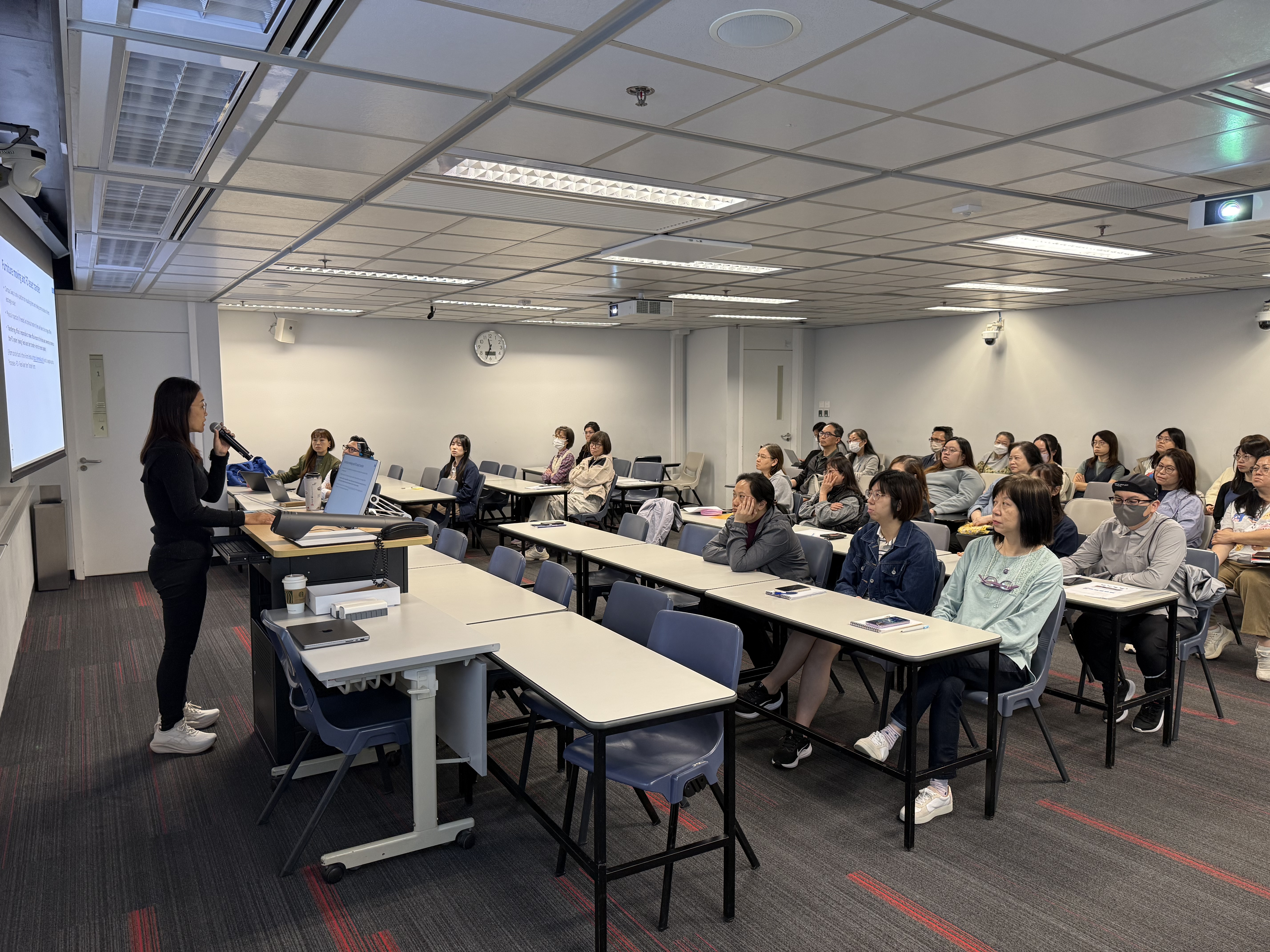
6. Climate Policies & Campus Operations
For any staff interested in learning more about the climate policies in Hong Kong and how they will affect the planning and operation of HKUST, please watch a video here.
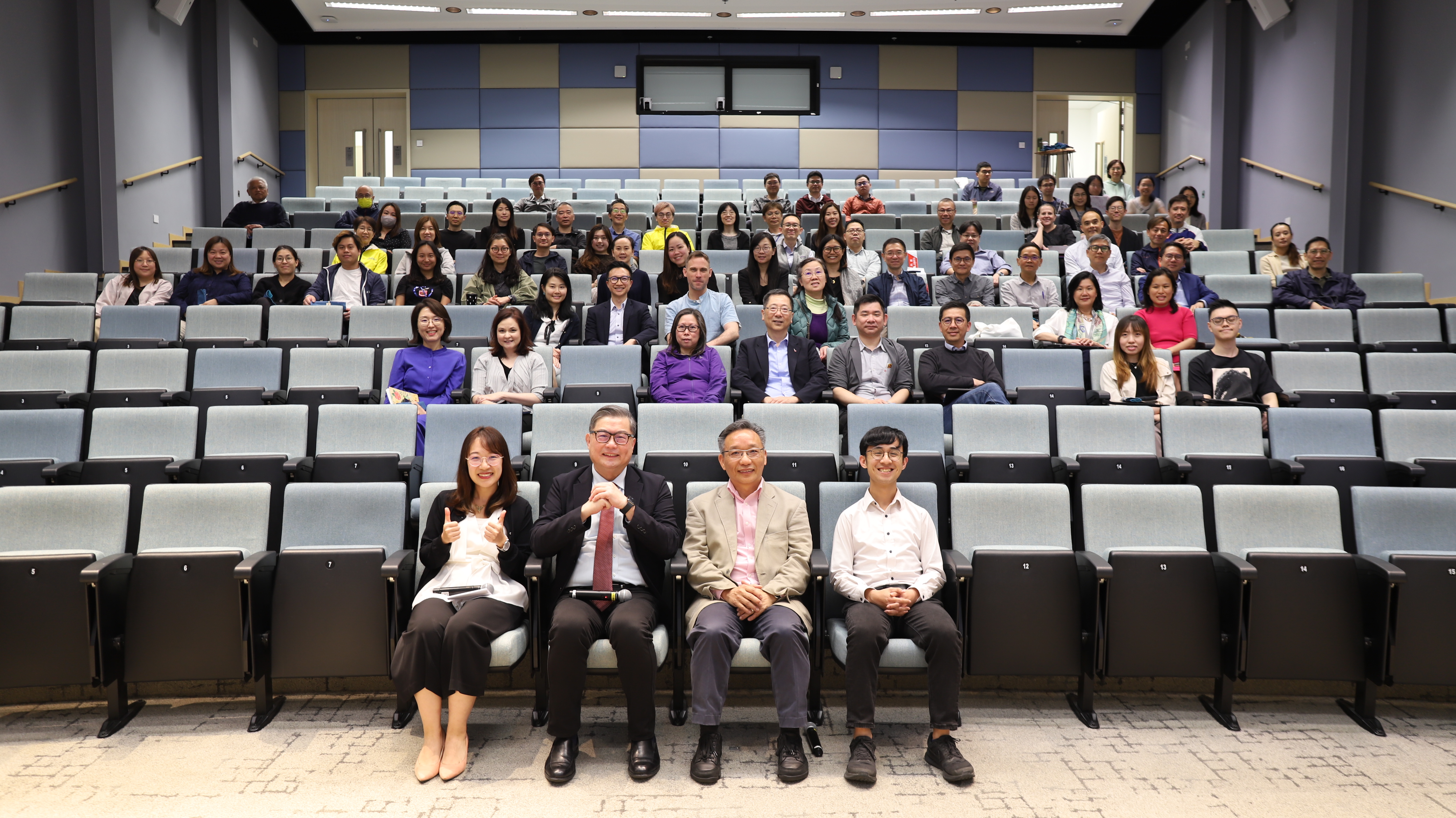
Sustainability Seminars / Workshops
Sustainability seminars / workshops serves different training needs of our professional and academic staff community.
- New Hire Orientation Program for academic and professional staff is offered for all new staff throughout the year. On average, this provides 4 hours of mandatory sustainability training annually. Sustainability initiatives available to staff are shared. This includes living lab research program, Sustainability Network for department representation, Green Team for self-initiated on-campus projects, special leave for volunteering, reusable lunchbox lending program, and Garage Sale Market.
- Sustainability seminars are offered for relevant and interested staff on new sustainability platform / initiative, and environmental policy updates. In the past, topics have included Campus Swap second-hand goods trading platform, waste-charging policy, external second-hand furniture supplier.
- Sustainability workshops have also covered topics like waste upcycling, biodiversity and hands-on practice on second-hand trading platform.
- Seminars on specific SDG topics covering gender equality, no poverty, zero hunger and are available to staff year-round.
New Hires Orientation Program (SDGs: All SDGs)
On 3 Dec 2024 and 20 Mar 2025, over 100 non-academic staff joined a half-day orientation program which included an introduction on the Sustainable Smart Campus as a Living Lab program. Tips for sustainable life at HKUST were also offered. This included the Green Team group, reusable lunchbox lending program, the Garage Sale Market, 4 days volunteering special leave, and to share your living lab idea.
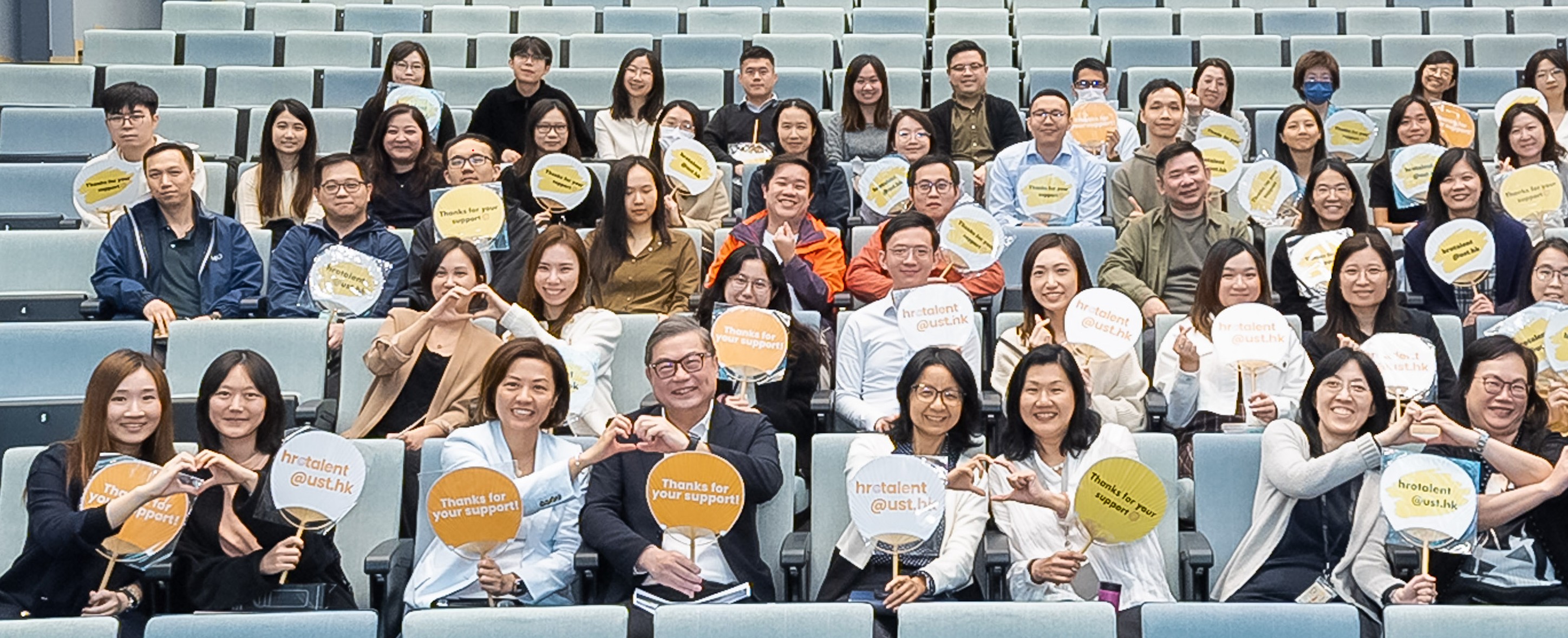
Building-integrated Photovoltaic (BIPV) (SDG 7 & 13)
A dynamic seminar about the building-integrated Photovoltaic (BIPV) technology by Prof. Peng Shou, Prof. Yang Hongxing, and Prof. Xiang Changying was held on on 9 September 2025.
Water Conservation Seminar (SDG 6 and SG 14)
On 26 September 2025, HKUST hosted a thought-provoking event featuring a Water Conservation Seminar and a Demonstration of the Sustainable Smart Campus as a Living Lab projects. The event welcomed 160 participants including students and teachers from three secondary schools and two primary schools, alongside with students, staff, and alumni from HKUST.
Campus Swap Platform Training Session - All Staff (SDG: 12)
The HKUST Campus Swap Platform kicked off in 2024 with training provided to department representatives back in Nov 2024. This one-hour follow up training scheduled for end Mar 2024 will be open to all staff interested in the free exchange of office items between departments.
Seminar on Environmental Policies & HKUST Sustainability Planning (SDGs: 7, 11, 12, 13, 17)
To be held on 26 Mar 2025, Dr Kenneth Leung, Director of Sustainability / Net-Zero Office will share his previous experience working on Hong Kong environmental policies in the Environment and Ecology Bureau and Environmental Protection Department. This allows HKUST to better align future developments with these policies. This will be open to all non-academic staff. Members from the Sustainable Operations Executive Committee, Campus Development Office, Campus Management Office, Human Resource Office, Health & Safety Office, Information Technology Services Office, Office of Institutional Data & Research, Development & Alumni Office, Office of Knowledge Transfer, and Global Engagement & Communications Office will be represented.
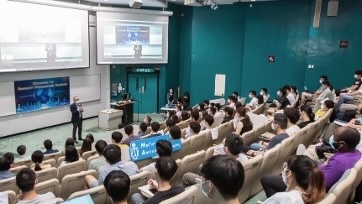
Campus Swap Platform Training Session (SDG: 12)
The HKUST Campus Swap Platform was developed by the Sustainability / Net-Zero Office and Information Technology Services Office in 2024. This online platform allows HKUST staff to list office items that are available to give away to another office and browse available items from another office. By encouraging the free exchange of office items, Campus Swap helps prevent usable items from ending up in landfills. Department representatives attended a training session on 18 Nov 2024 2:30-4pm to get hands-on-practices and learn about the features and usage of the platform.
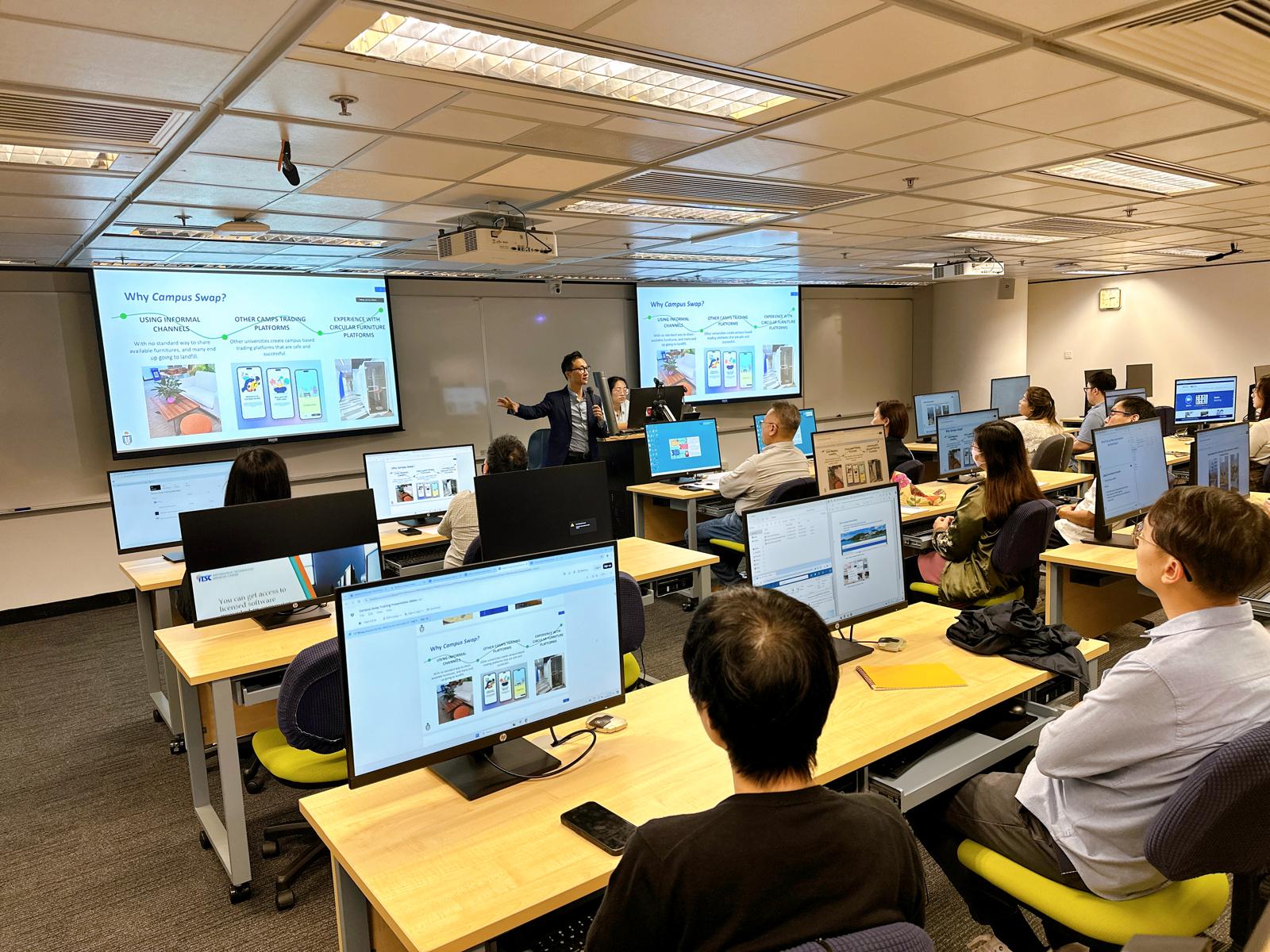
Volunteering & Time Auction Briefing Session (SDGs: 1-5, 8, 10, 12-15)
HKUST had initiated a staff special leave program for volunteering services to give back to the community. The online briefing session with Time Auction was held on 18 Oct 2024 at 1-2pm to introduce the volunteering landscape in Hong Kong and introduce the Time Auction platform which provides diverse volunteer opportunities, and the empowering rewards that can be redeemed with volunteer hours. NGO partner Body Banter shared how volunteers made an impact to their charity and upcoming opportunities. HKUST staff shared their personal and team volunteering stories.

Sustainable Office Solutions & Second-Hand Office Furniture Circularity (SDG: 12)
Ms Melanie Cheng, Sustainable Solutions Strategist from Sustainable Office Solutions Ltd. gave a presentation on 26 Mar 2024 10-11am to department representatives from Sustainability Network. Ms Melanie shared their operations and opportunities that would support HKUST's circularity and waste reduction goals by offering matching of second-hand office furniture from corporates / schools / NGOs with carbon tracking.
Food Waste Bracelet Upcycling Workshop (SDG 12)
Ways Out Hong Kong is a social enterprise that uses food waste jewelry as a creative means to empower young single mothers by providing them with training and employment. In this workshop, staff learnt about how fruit peels and vegetable scraps can be transformed into meaningful jewelry through this hands-on workshop held on 18 Dec 2024 12:30-1:30pm.
International Women’s Day 2025 Panel Discussion Event: How Allyship Accelerates Action for Diversity and Inclusion (SDGs: 5, 10)
Held on 6 Mar 2025, 12:30-1:45pm, this panel discussion on gender diversity and equality featured a panel of speakers from the business community and from HKUST. Personal insights and experience covered topics on:
-
What is allyship and why is it important?
-
What does it mean to be an ally to underrepresented groups with interconnected attributes in the workplace, at home and in the community?
-
In the context of gender diversity and inclusion, how do we involve both men and women in the conversations and actions?
-
What are the everyday actions each individual can do to achieve progress?
From Branding to Social Entrepreneurship (SDGs: 3, 10, 17)
An International Women's Day event on 4 Mar 2025 6-7:20pm, Ms Queenie Man, Founder and CEO of The Project Futures and Managing Director at Forward Living shared her journey on how she used her branding experience to reshape perceptions and drive community engagement. She designed innovative initiatives like "Captain Softmeal" to raise awareness about dysphagia, and "Sensory Restaurant on Wheels" to enhance dining experiences for elders with dementia. This allowed both staff and students to gain insights into the use of branding for social good and to actively promote positive ageing.
Sustainability Literacy Survey
At HKUST, we are committed to fostering a deep understanding of sustainability for all staff from wide ranging departments. Sustainability Literacy Survey is utilized as an educational tool to help all staff enhance their awareness and reflect on their understanding of key sustainability concepts and current government policies.
HKUST employs a recognised methodology to assess the interconnectedness of social, economic and environmental issues, covering UN SDGs, climate change basics, climate resilience, ESG issues, system thinking, global poverty and social equity. This aligns with Hong Kong's strategic climate directives. Tailored questions designed as per AASHE guidelines assess our community. Explanations and references to videos and materials are provided to reinforce the learning. This survey is shared with all staff and students.
The outcomes allow us to track our progress and further improve sustainability education and operations.
More details about the Sustainability Literacy Survey and 2021-2023 Sustainability Literacy Survey can be found here.
Sustainability Volunteering
With 4 days special leave available, staff volunteering opportunities relating to sustainability are available year-round through various avenues. Within HKUST, departments such as HKUST Connect, Sustainability / Net-Zero Office, Human Resource Office and Staff Association organizes these activities for staff. HKUST is also a member organization of Time Auction, a volunteering platform whereby individual staff can sign up to sustainability training through volunteering experience. Themes relate to waste upcycling, marine-system restoration, farming and tree planting, and resource distribution for the needy. More details are available here.
Sustainable Landscaping Volunteer Workshop (SDG 15)
As part of the Inter-Company Volunteer Week, the HKUST Campus Management Office also hosted a Sustainable Landscaping Volunteer Workshop in December 2025. Collaborating with dedicated volunteers from UBS and MTR, we embraced sustainable landscaping practices to benefit our campus and community. Under the guidance of our Arborist, Wicky Lee, and the Landscaping Team, volunteers learned how to enhance our vibrant environment and promote local biodiversity. Activities included mowing the LG7 lawn and applying wood chips on the LG5 bridge link to improve soil quality and water retention while reducing weeds.
On-Campus Pak Shui Wun Beach Clean-Up (SDG 14) and Student Hall Move-Out Recycling (Drop & Adopt Campaign) (SDG 12)
In December 2025, staff volunteers supported the beach clean-up in Pak Shui Wun near campus and “Drop & Adopt” campaign. During the student hall move-out period, we collected a range of bedding, appliances, and household items from student residnts. We called for volunteers and green team members to sort and prepare these items for distribution back to our community, promoting reuse and warmly welcoming new students.
Open Lab: A Sustainable Textile Initiative (SDG 12)
Held on 12 Mar 2025 2-5:30pm, staff were involved in hands-on experience in preparing garment for recycling through the Green Machine, specifically targeting PET-cotton blended post-consumer textile fibers. Staff volunteers will also tour the Open Lab to gain insights into Hong Kong textile industry's inner workings.
Crossroads Foundation (SDG 12)
Crossroads Foundation is a non-profit organization providing aid for relief and development in over 90 countries. On 21 Feb 2025 12:45-5pm, Through providing logistic supporting, sorting donation materials, and helping with repairs, staff volunteers made a different to people living in vulnerable circumstances in Hong Kong and Malawi.
Beach Clean-up and Inter-company Ocean Research Facility Visit (SDG 14)
On 11 Dec 2024 2-5pm, HKUST staff members, together with members of the public took part in the beach clean-up activity and educational tour at the Ocean Research Facility.
Lok Yin Farm Volunteering Day (SDG 15)
An organic farm in Lamma Island, the activity on 19 Apr 2024 1:30-5:30pm provided staff and students with hands-on experience on organic farming practices. Staff took part in weeding, watering and other farming maintenance work during the event.
HKUST Tree Transplanting Activity (SDGs: 12, 15)
Over 70 staff and students participated in the tree transplanting event on 14 Nov 2023 1-4pm. The objective was to rescue 40 native saplings from the woodland area where Research Building 2, a new lab building is being constructed. By transplanting these native saplings, including endangered species, staff contributed to preserving Hong Kong's unique biodiversity.
Sustainability Network
The HKUST Sustainability Network connects departmental representatives to drive coordinated action toward campus sustainability concerning departmental purchases and operations. They play a vital role in advancing sustainability actions and policies on campus. Comprising representatives from various offices, departments, and schools, the network serves as a social backbone, sharing ideas, providing updates, celebrating successes, and offering feedback on new initiatives. The objectives of the Sustainability Network are to foster collaboration, share best practices, and engage colleagues in sustainable office practices.
To equip our Sustainability Network Representatives with the necessary knowledge and skills, we provide regular trainings in collaboration with external speakers and our Sustainability / Net-Zero Office. Recent training sessions have covered topics such as biodiversity impact, waste charging scheme, and the Sustainable Smart Campus Initiative. These trainings empower representatives to incorporate sustainability principles into their office operations and serve as advocates for change within their respective departments.
Green Team
The Green Team, comprising staff and students volunteers actively participate in creating a more sustainable campus environment through community-driven initiative aimed at operating our campus in a more efficient, environmentally-friendly, and healthy way. Members of the Green Team are involved in real, hands-on projects that improve our campus and community. They contribute ideas for campus greening, waste management and wellbeing projects, which can be implemented by the team members themselves or forwarded to relevant operations offices for consideration.
The Green Team also provides training in organic gardening techniques, allowing participants to cultivate their own sustainable practices while fostering a connection with nature.

April 2019: National Geographic exhibition: 'Planet or Plastic' designed by Sustainability Unit and Green Team